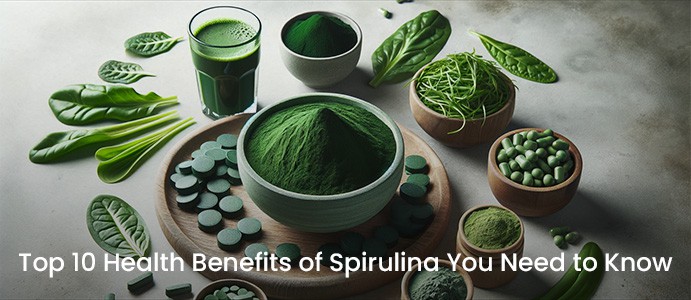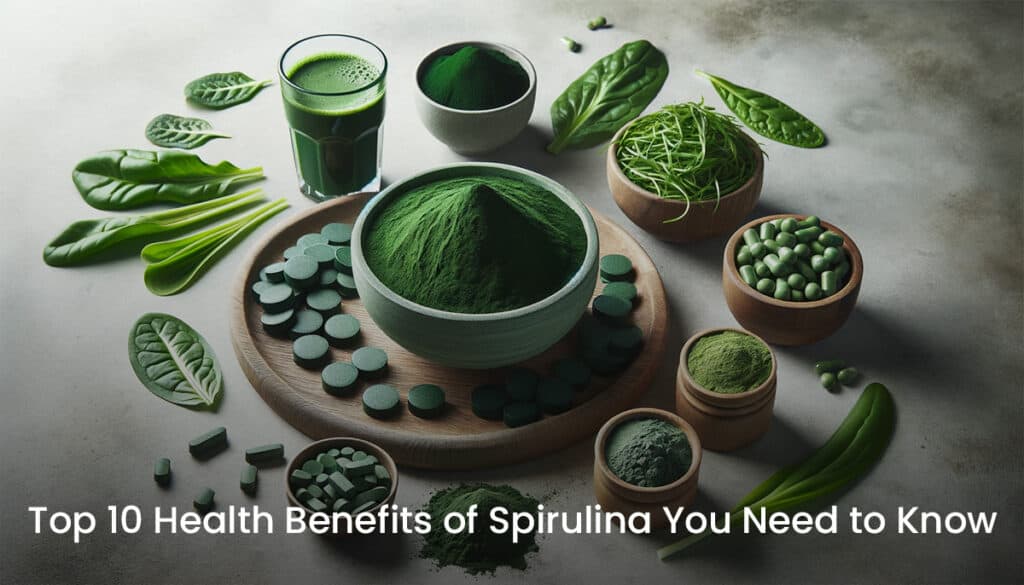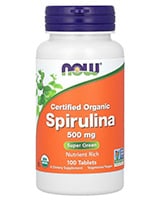

Spirulina, a type of blue-green algae, has gained popularity for its remarkable health benefits. Packed with nutrients and antioxidants, it offers a wide range of health advantages. This article explores the top 10 health benefits of spirulina, based on scientific research and studies.
Nutrient-Rich Profile
Spirulina stands out for its nutrient-rich profile[1]Karkos, P. D., Leong, S. C., Karkos, C. D., Sivaji, N., & Assimakopoulos, D. A. (2011). Spirulina in clinical practice: Evidence-based human applications. Evidence-Based Complementary and Alternative Medicine, 2011. https://doi.org/10.1093/ecam/nen058. It is an excellent source of proteins, essential amino acids, and vitamins including B-complex, E, and K. Minerals like iron, magnesium, and manganese are abundantly found in spirulina. This makes spirulina not just a supplement but a powerhouse of nutrients, beneficial for maintaining a healthy diet, especially for vegetarians and vegans who might find it challenging to get these nutrients from plant-based sources.
Powerful Antioxidant and Anti-Inflammatory Properties
Spirulina contains antioxidants, with phycocyanin being the most notable[2]Stunda-Zujeva, A., Berele, M., Lece, A. et al. (2023). Comparison of antioxidant activity in various spirulina containing products and factors affecting it. Scientific Reports, 13, 4529. https://doi.org/10.1038/s41598-023-31732-3. Phycocyanin not only gives spirulina its unique blue-green colour but also plays a crucial role in protecting the body against oxidative stress. Oxidative stress can lead to chronic inflammation, contributing to various chronic diseases. By combating oxidative stress and inflammation, spirulina supports overall health and wellness.
May Lower LDL and Triglyceride Levels
Research indicates that spirulina can have a positive effect on blood lipids[3]DiNicolantonio, J. J., Bhat, A. G., & OKeefe, J. (2020). Effects of spirulina on weight loss and blood lipids: A review. Open Heart, 7(1). https://doi.org/10.1136/openhrt-2018-001003, reducing “bad” LDL cholesterol and triglycerides. Some studies have also shown an increase in “good” HDL cholesterol levels in individuals taking spirulina supplements. This lipid-lowering effect is essential for preventing heart disease and improving cardiovascular health.
Protects Against LDL Oxidation
Beyond lowering LDL levels, spirulina helps protect LDL cholesterol from oxidation[4]Ismail, M., Hossain, M. F., Tanu, A. R., & Shekhar, H. U. (2015). Effect of spirulina intervention on oxidative stress, antioxidant status, and lipid profile in chronic obstructive pulmonary disease patients. BioMed Research International, 2015. https://doi.org/10.1155/2015/486120. Oxidized LDL is a key factor in the development of atherosclerosis, leading to heart attacks and strokes. The antioxidants in spirulina, especially phycocyanin, are effective in preventing LDL oxidation, offering an additional layer of protection against heart disease.
Potential Anticancer Properties
Preliminary research suggests that spirulina may have properties that could reduce the risk of cancer. Studies involving animals and test tubes have indicated that spirulina can decrease cancer occurrence and even reduce the size of tumours[5]Ge, Y., Kang, K., Dong, L., Liu, H., & An, Y. (2019). The efficacy of dietary spirulina as an adjunct to chemotherapy to improve immune function and reduce myelosuppression in patients with malignant tumors. Translational Cancer Research, 8(4), 1065-1073. https://doi.org/10.21037/tcr.2019.06.13. Although more research is needed to confirm these effects in humans, the potential anticancer properties of spirulina are promising and suggest it may play a role in cancer prevention and support.
Improves Muscle Strength and Endurance
Spirulina’s benefits extend to improving physical fitness. Research has shown that spirulina supplementation can enhance muscle strength and endurance[6]Calella, P., Cerullo, G., Dio, M. D., Liguori, F., Onofrio, V. D., Gallè, F., & Liguori, G. (2022). Antioxidant, anti-inflammatory and immunomodulatory effects of spirulina in exercise and sport: A systematic review. Frontiers in Nutrition, 9. https://doi.org/10.3389/fnut.2022.1048258. This is particularly beneficial for athletes and those engaged in regular physical activity, as it can help reduce exercise-induced muscle damage and improve exercise performance. The amino acids and antioxidants in spirulina are thought to be responsible for these positive effects on muscle function.
May Reduce Blood Pressure
High blood pressure is a significant risk factor for many chronic diseases, including heart disease and stroke. Spirulina has been found to help lower blood pressure[7]Machowiec, P., Ręka, G., Maksymowicz, M., Piecewicz-Szczęsna, H., & Smoleń, A. (2021). Effect of spirulina supplementation on systolic and diastolic blood pressure: Systematic review and meta-analysis of randomized controlled trials. Nutrients, 13(9). https://doi.org/10.3390/nu13093054 in some studies, attributed to its ability to increase the production of nitric oxide. Nitric oxide is a signalling molecule that helps blood vessels relax and dilate, leading to reduced blood pressure. This property of spirulina makes it a valuable supplement for those looking to manage their blood pressure naturally.
Helps With Blood Sugar Control
For individuals with diabetes or at risk of developing diabetes, spirulina may offer benefits in blood sugar management. Several studies have demonstrated that spirulina can lower blood sugar levels[8]Hatami, E., Ghalishourani, S., Najafgholizadeh, A., Pourmasoumi, M., Hadi, A., T. Clark, C. C., Assaroudi, M., Joukar, F., & Mansour-Ghanaei, F. (2021). The effect of spirulina on type 2 diabetes: A systematic review and meta-analysis. Journal of Diabetes and Metabolic Disorders, 20(1), 883-892. https://doi.org/10.1007/s40200-021-00760-z, making it a potential supplemental treatment for diabetes. Its effects on blood sugar and insulin sensitivity could help prevent the spikes and crashes that affect individuals with blood sugar management issues, though it should be used in conjunction with traditional diabetes treatments and lifestyle changes.
Allergy Relief
Spirulina has shown promise in providing relief from allergic rhinitis[9]Nourollahian, M., Rasoulian, B., Gafari, A., Anoushiravani, M., Jabari, F., & Bakhshaee, M. (2020). Clinical comparison of the efficacy of spirulina platensis and cetirizine for treatment of allergic rhinitis. Acta Otorhinolaryngologica Italica, 40(3), 224-229. https://doi.org/10.14639/0392-100X-N0139—commonly known as hay fever. Studies suggest that spirulina can reduce symptoms such as sneezing, nasal congestion, itching, and runny nose. This benefit is attributed to its anti-inflammatory and antioxidant effects, which help reduce the body’s allergic response.
May Improve Anemia
Anemia, characterized by a reduced number of red blood cells, can lead to fatigue and weakness. Spirulina has been studied for its potential to combat anemia, particularly in the elderly. Its high iron content, along with vitamins B12 and folic acid, can help improve hemoglobin levels in the blood[10]Selmi, C., Leung, P. S., Fischer, L., German, B., Yang, C. Y., Kenny, T. P., Cysewski, G. R., & Gershwin, M. E. (2011). The effects of spirulina on anemia and immune function in senior citizens. Cellular and Molecular Immunology, 8(3), 248-254. https://doi.org/10.1038/cmi.2010.76, thus addressing symptoms of anemia and improving overall energy levels.
Conclusion
Spirulina is more than just a dietary supplement. Its wide array of health benefits—from improving nutrient intake to potentially reducing the risk of chronic diseases—makes it a valuable addition to a healthy lifestyle. However, it’s important to consult with a healthcare provider before incorporating spirulina or any other supplements into your diet, especially if you have existing health conditions or are taking medications.
Buy Spirulina Online Review Comparison Table
 Spirulina | iHerb | 100 pills (500mg) | $6.11 |  Worldwide, AU | Visit Website >> |
References
| ↑1 | Karkos, P. D., Leong, S. C., Karkos, C. D., Sivaji, N., & Assimakopoulos, D. A. (2011). Spirulina in clinical practice: Evidence-based human applications. Evidence-Based Complementary and Alternative Medicine, 2011. https://doi.org/10.1093/ecam/nen058 |
|---|---|
| ↑2 | Stunda-Zujeva, A., Berele, M., Lece, A. et al. (2023). Comparison of antioxidant activity in various spirulina containing products and factors affecting it. Scientific Reports, 13, 4529. https://doi.org/10.1038/s41598-023-31732-3 |
| ↑3 | DiNicolantonio, J. J., Bhat, A. G., & OKeefe, J. (2020). Effects of spirulina on weight loss and blood lipids: A review. Open Heart, 7(1). https://doi.org/10.1136/openhrt-2018-001003 |
| ↑4 | Ismail, M., Hossain, M. F., Tanu, A. R., & Shekhar, H. U. (2015). Effect of spirulina intervention on oxidative stress, antioxidant status, and lipid profile in chronic obstructive pulmonary disease patients. BioMed Research International, 2015. https://doi.org/10.1155/2015/486120 |
| ↑5 | Ge, Y., Kang, K., Dong, L., Liu, H., & An, Y. (2019). The efficacy of dietary spirulina as an adjunct to chemotherapy to improve immune function and reduce myelosuppression in patients with malignant tumors. Translational Cancer Research, 8(4), 1065-1073. https://doi.org/10.21037/tcr.2019.06.13 |
| ↑6 | Calella, P., Cerullo, G., Dio, M. D., Liguori, F., Onofrio, V. D., Gallè, F., & Liguori, G. (2022). Antioxidant, anti-inflammatory and immunomodulatory effects of spirulina in exercise and sport: A systematic review. Frontiers in Nutrition, 9. https://doi.org/10.3389/fnut.2022.1048258 |
| ↑7 | Machowiec, P., Ręka, G., Maksymowicz, M., Piecewicz-Szczęsna, H., & Smoleń, A. (2021). Effect of spirulina supplementation on systolic and diastolic blood pressure: Systematic review and meta-analysis of randomized controlled trials. Nutrients, 13(9). https://doi.org/10.3390/nu13093054 |
| ↑8 | Hatami, E., Ghalishourani, S., Najafgholizadeh, A., Pourmasoumi, M., Hadi, A., T. Clark, C. C., Assaroudi, M., Joukar, F., & Mansour-Ghanaei, F. (2021). The effect of spirulina on type 2 diabetes: A systematic review and meta-analysis. Journal of Diabetes and Metabolic Disorders, 20(1), 883-892. https://doi.org/10.1007/s40200-021-00760-z |
| ↑9 | Nourollahian, M., Rasoulian, B., Gafari, A., Anoushiravani, M., Jabari, F., & Bakhshaee, M. (2020). Clinical comparison of the efficacy of spirulina platensis and cetirizine for treatment of allergic rhinitis. Acta Otorhinolaryngologica Italica, 40(3), 224-229. https://doi.org/10.14639/0392-100X-N0139 |
| ↑10 | Selmi, C., Leung, P. S., Fischer, L., German, B., Yang, C. Y., Kenny, T. P., Cysewski, G. R., & Gershwin, M. E. (2011). The effects of spirulina on anemia and immune function in senior citizens. Cellular and Molecular Immunology, 8(3), 248-254. https://doi.org/10.1038/cmi.2010.76 |

Leave a Reply